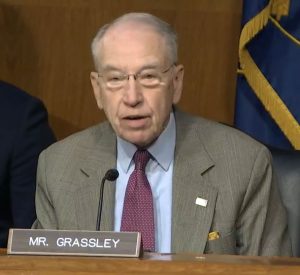Iowa senators say USDA ‘dropped the ball’ on now-defunct chicken processor
October 29th, 2024 by Ric Hanson
(Radio Iowa) – Iowa’s two U-S senators are questioning why Pure Prairie Poultry, which recently declared bankruptcy, was given tens of millions of federal dollars. Senator Chuck Grassley says two years ago, the U-S-D-A handed the Minnesota-based company a near-seven-million dollar grant along with guaranteed loans of almost 39-million. “We all know it’s very important for the USDA to support the farm economy, especially in today’s tough market,” Grassley says, “but companies don’t just fail out of the blue.” When the company’s plant in Charles City closed this month, it left around 50 farmers in Iowa, Wisconsin and Minnesota without processing capacity or feed for more than two-million chickens. Plus, another 100 Iowans lost their jobs.
Grassley questions when it became apparent the company was going to fail. “This proposition raises questions about how well the Department of Agriculture is overseeing the federal funding it administers,” Grassley says. “For example, does the USDA have a process for vetting companies before it gives away taxpayer dollars? More importantly, are there other companies in a similar financial situation right now?” Senator Joni Ernst says “Pure Prairie Poultry’s abrupt closure shows the importance of proper vetting and oversight at USDA,” and says those funds need to help producers, “rather than being flushed down the drain and harming entire rural communities.” Grassley agrees.

Senator Grassley (file)
“Taxpayers have a right to know how the government is spending their money,” Grassley says. “We need to assist the workers and the farmers, and I’ll keep pushing for full enforcement of the Packers and Stockyards Act to create a better environment for small processors.” Grassley was asked if he thinks the owners or managers of Pure Prairie Poultry did something wrong, or whether they should pay the U-S-D-A back. “I don’t have any evidence they did anything illegally, but obviously bad management, I think without a doubt, you can say that,” Grassley says. “In the situation they’re in, they have no ability to pay the money back. If they did, I would expect them to, if there’s $1 left over, that ought to be paid back.”
Grassley says it’s the U-S-D-A that’s “responsible for keeping tabs on the taxpayer-funded grants it administers, but it clearly dropped the ball with Pure Prairie.” He’s asking the agency to explain to Congress and the public “what went wrong to help prevent a repeat scenario.”





